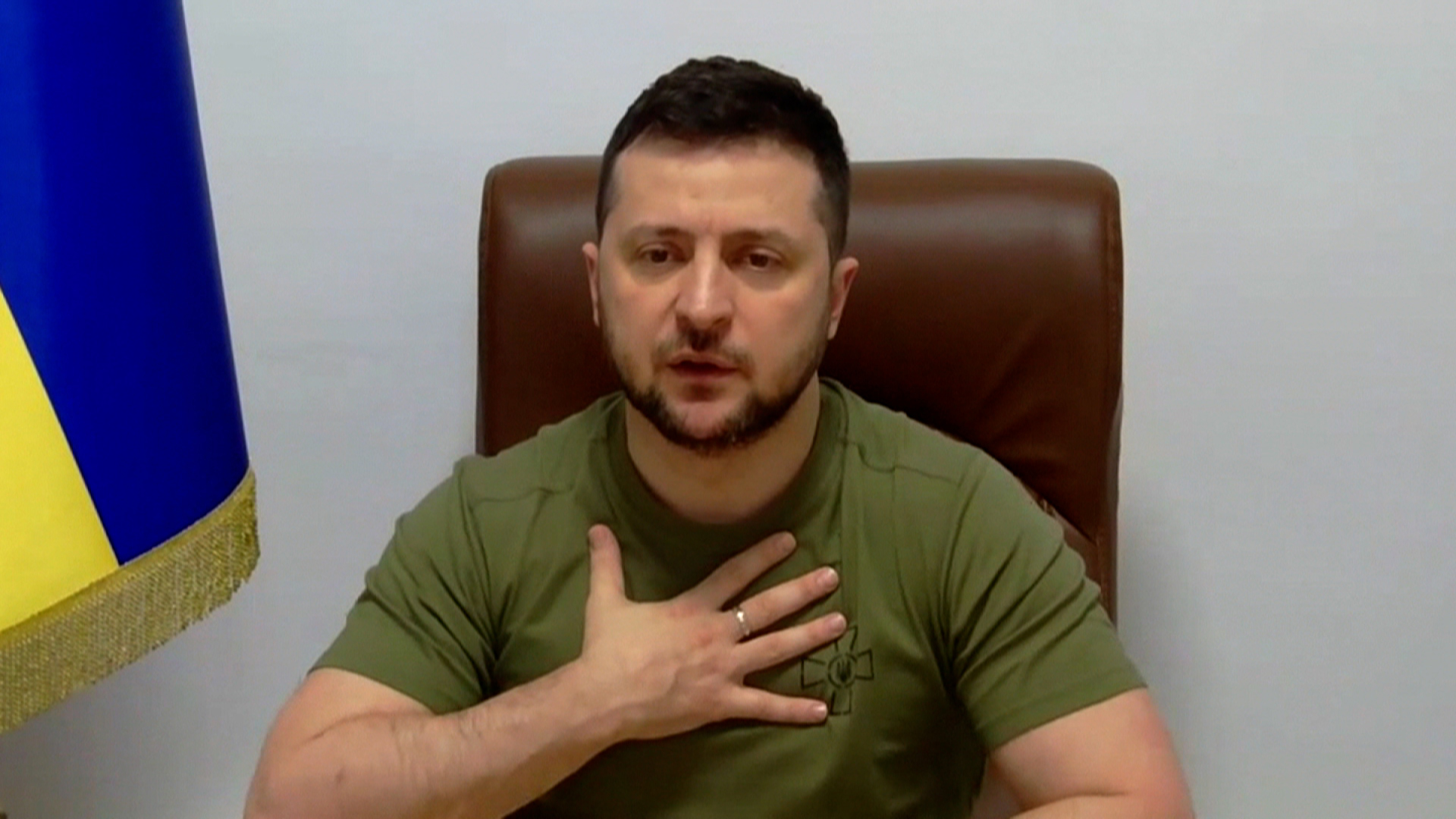To provide a European perspective and assess how Georgia meets the conditions for obtaining candidate status - this was the verdict of the European Commission of June 17, 2022, which all of Georgia was waiting for. But "Companions" Ukraine and Moldova, together with the prospect, also received a recommendation for granting the status of a candidate for EU membership.
According to the same recommendation, Georgia will become a candidate for EU membership if it manages to pull itself out of the quagmire and implement the already repeatedly demanded reforms in the judiciary, eliminate political polarization, achieve de-oligarchization, effectively investigate crimes, promote the creation of a free, professional and independent media, etc.
The recommendation published by the European Commission on June 17 was a disappointment for many of our compatriots. The opportunity that arose against the backdrop of the Russian-Ukrainian war and the feeling of not using it; Anger at the government or at our own helplessness and a faint hope in our hearts that the Council of Europe will not heed the recommendation of the European Commission - this is probably an incomplete list of feelings and hopes that each of us experienced on June 17th.
The optimistic expectations regarding the status of the candidate for EU membership and the unconditional perception of the advantages of the European choice were once again demonstrated by the survey of 802 respondents conducted by ACT. It is noteworthy that the fieldwork on the study was completed the day before the meeting of the European Commission on June 17 and covered the period from June 11 to 16. The sampling error of the study was 4.2%.
Georgian people against Napoleon
Geography is destiny - this phrase is attributed to Napoleon Bonaparte. However, outstanding Georgians believed in changing this fate centuries ago and believe today when we are trying to become members of the European family, despite the fact that we do not have a direct border with it. Europe not only gives many advantages for us in specific areas, but also embodies values that bring us back to the path of our ancestors.
Therefore, the vast majority of respondents have no doubt that the status of an EU candidate - as a path to full EU membership - is important: 84% of respondents think so. The number of those to whom the status of a candidate for EU membership seems insignificant does not exceed 11%.
In your opinion, how important is it for Georgia to obtain the status of an EU candidate?
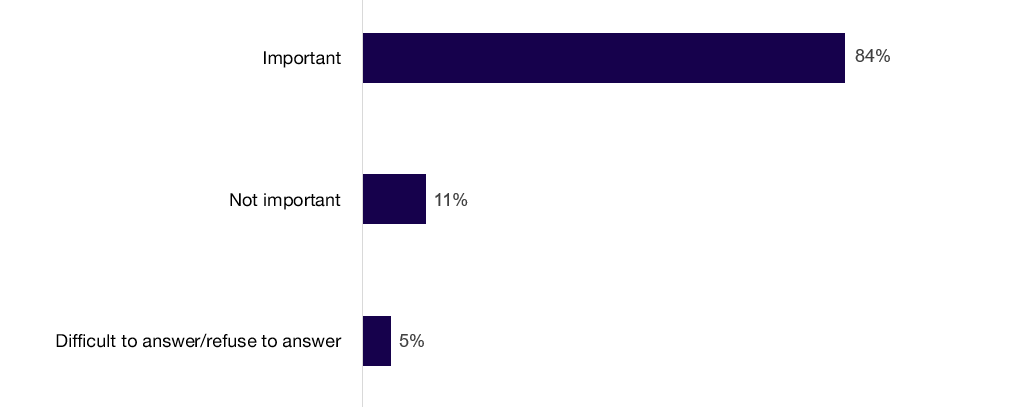
At the same time, every second respondent expects to receive the status of a candidate member of the EU in the coming months (50%). 33% do not hope to get the status, and 17% of respondents found it difficult to answer the question.
Associated Trio - Together Until the End
The associated trio of countries - Georgia, Ukraine and Moldova - along with their declared aspirations for European integration have a common heavy Russian legacy and lost territories. A similar context and a distinct orientation towards EU membership at first glance seem to have similar prospects, although the recommendations of the European Commission of 17 June confirmed a somewhat different perception of Georgia. Moldova, which has pulled ahead, has become a kind of disappointment against the background of the fact that the country does not participate in hostilities, and there is definitely no leap forward seen by the naked eye.
The fact that the chances for EU membership for Georgia and Moldova, from the point of view of the population, were very similar, was also confirmed by the study. According to the data, respondents emphasized Ukraine's high chances of obtaining candidate status, while Georgia and Moldova were rated roughly the same.
It can be assumed that in the case of Ukraine, which is at war and daily reflects Russian aggression, the decision could be taken for granted to some extent.
But in relation to Moldova, the perception of equal opportunities and the result contradicted the expectations of the population. They believed, that Georgia will also become a candidate for EU membership.
How do you assess Georgia's chances of obtaining EU member status? For Ukraine? For Moldova?
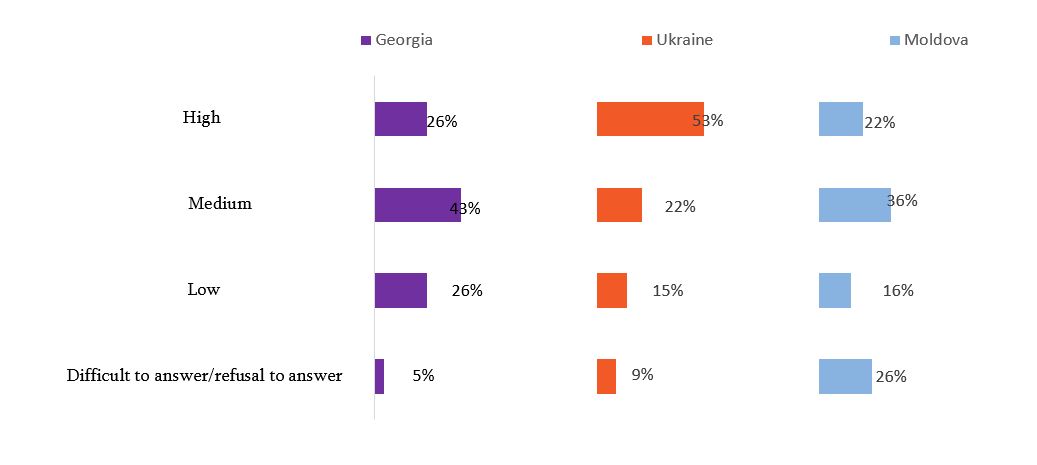
An indirect confirmation that the population was waiting for the EU candidate status is the response to the statement “Georgia is closer to EU membership than ever”, with which almost 4 out of 5 respondents (76%) agreed, and only 1 respondent disagreed ( 21%). 3% of respondents could not answer the question. It is possible that agreeing to the position would also mean seizing a favorable moment in the world political arena, which the country was unable to take advantage of. This is evidenced by the opinion of 2/3 of the respondents that “if Georgia does not receive the status of a candidate for EU membership in the near future, then it will not have such a chance for a long time” (66%).
Do you agree with the following terms:
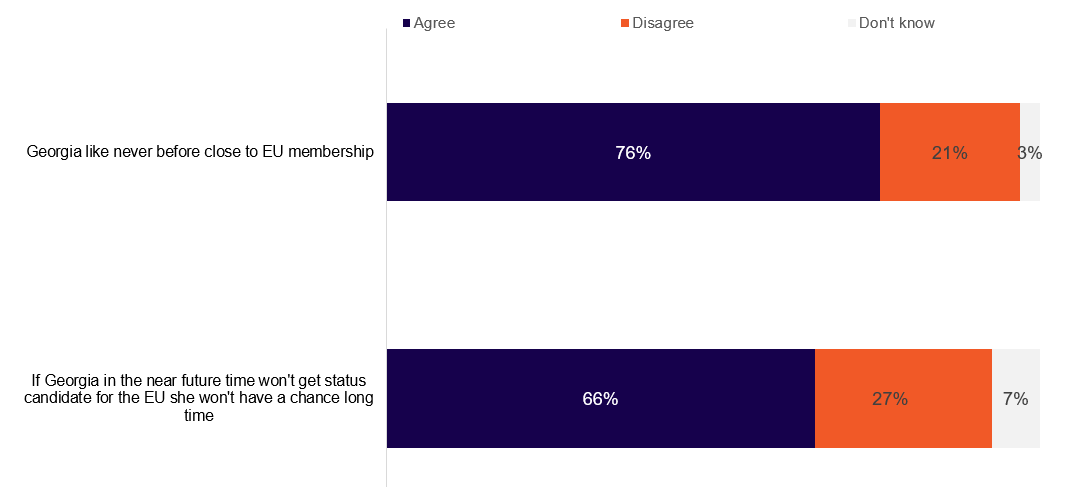
Merits and Responsibilities for Expected Status
The question of whether the country will receive the status of an EU candidate and whose merit it will be, showed how discredited the political class in the country is and how much citizens remain confident only in themselves. In particular, in the case of the status of a candidate for EU membership, the majority of respondents see the merit of the people, not politicians (40%). In general, the role of the Georgian government in this process is 2 times less - 20% of respondents. 14% point to the role of the parliament, the prime minister and the president as a whole. 9% of respondents talk about the role of Western/European partners.
In the event that the country does not receive the status of a candidate member of the EU, the responsibility, according to 4 out of 10 respondents (38%), lies with the government of Georgia. According to 16% of respondents, the Parliament of Georgia, the President, the Prime Minister and Bidzina Ivanishvili are also responsible for the current situation. 12% of respondents also see the opposition parties as guilty.
In your opinion, if Georgia receives the status of a candidate for EU membership, whose merit will it be?
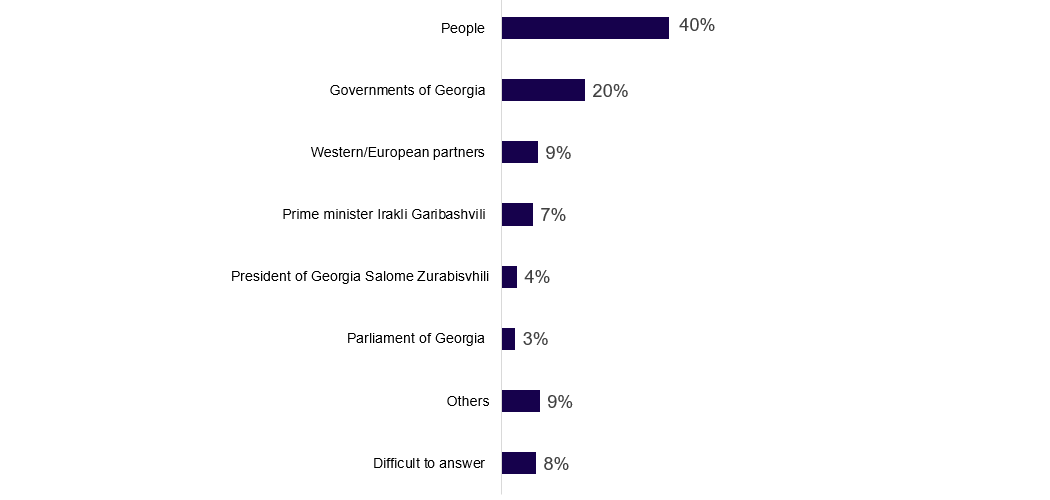
In your opinion, if Georgia does not receive the status of an EU candidate, who will be responsible for this?
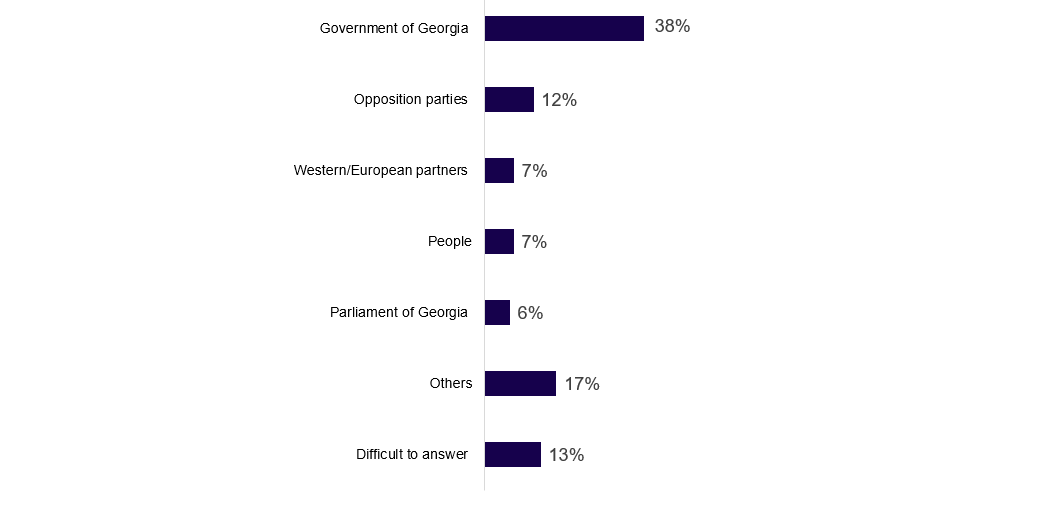
EU membership is equal to the developed future of the country
The benefits of EU membership for the population are quite obvious. In particular, for 9 out of 10 respondents, EU membership directly means a developed future for the country (90%), greater interest and motivation of abkhazs and Ossetians citizens to join Georgia (72%), protection from Russian military aggression (66%). Moreover, not only membership in the EU, but even the status of a candidate for its membership for the vast majority of respondents (84%) is a clear signal for Russia that the country has chosen a Western course. It can be assumed that for this part of the respondents, the failure to obtain the status of a candidate for EU membership indicates, if not directly the opposite, then it may still indicate a dubious foreign policy orientation of the country.
Do you agree with the following terms:
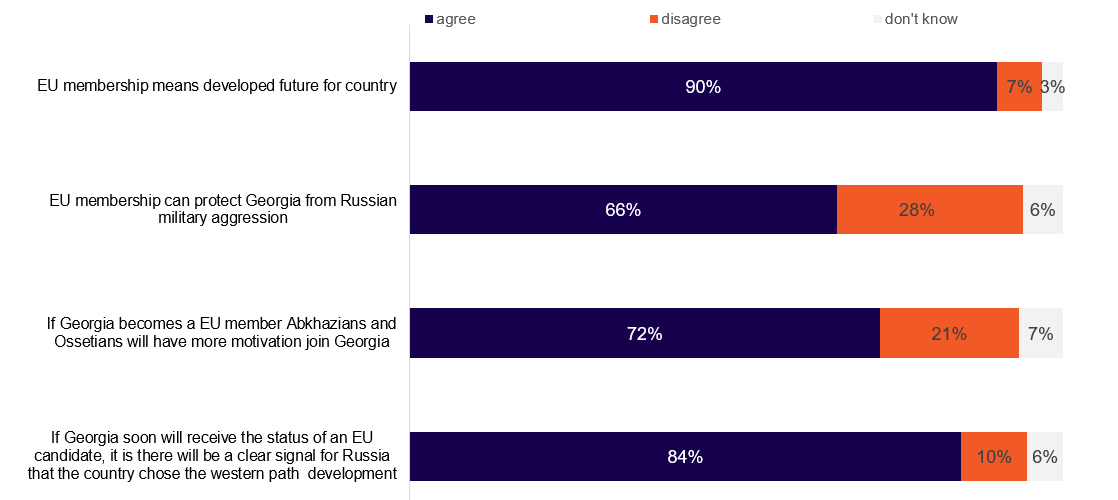
As for the benefits of joining the EU by industry, the respondents most of all expect positive things in the economy (57%). This answer is far behind, although in terms of frequency of mention, the second or third place is occupied by education (42%) and the protection of human rights and the rule of law (41%). The top five also include benefits in healthcare (35%) and military (36%) – the perception of the EU's role in the latter is likely due to events in Ukraine.
It should also be noted that the absolute majority of respondents - 89% perceived the granting of the status of a candidate for EU membership in the near future as a fair decision in relation to Georgia. Therefore, it is important that the decision of June 17 does not increase the feeling of apathy, and that the country's authorities do everything possible to implement the package of recommendations and stand on the right side of history.






